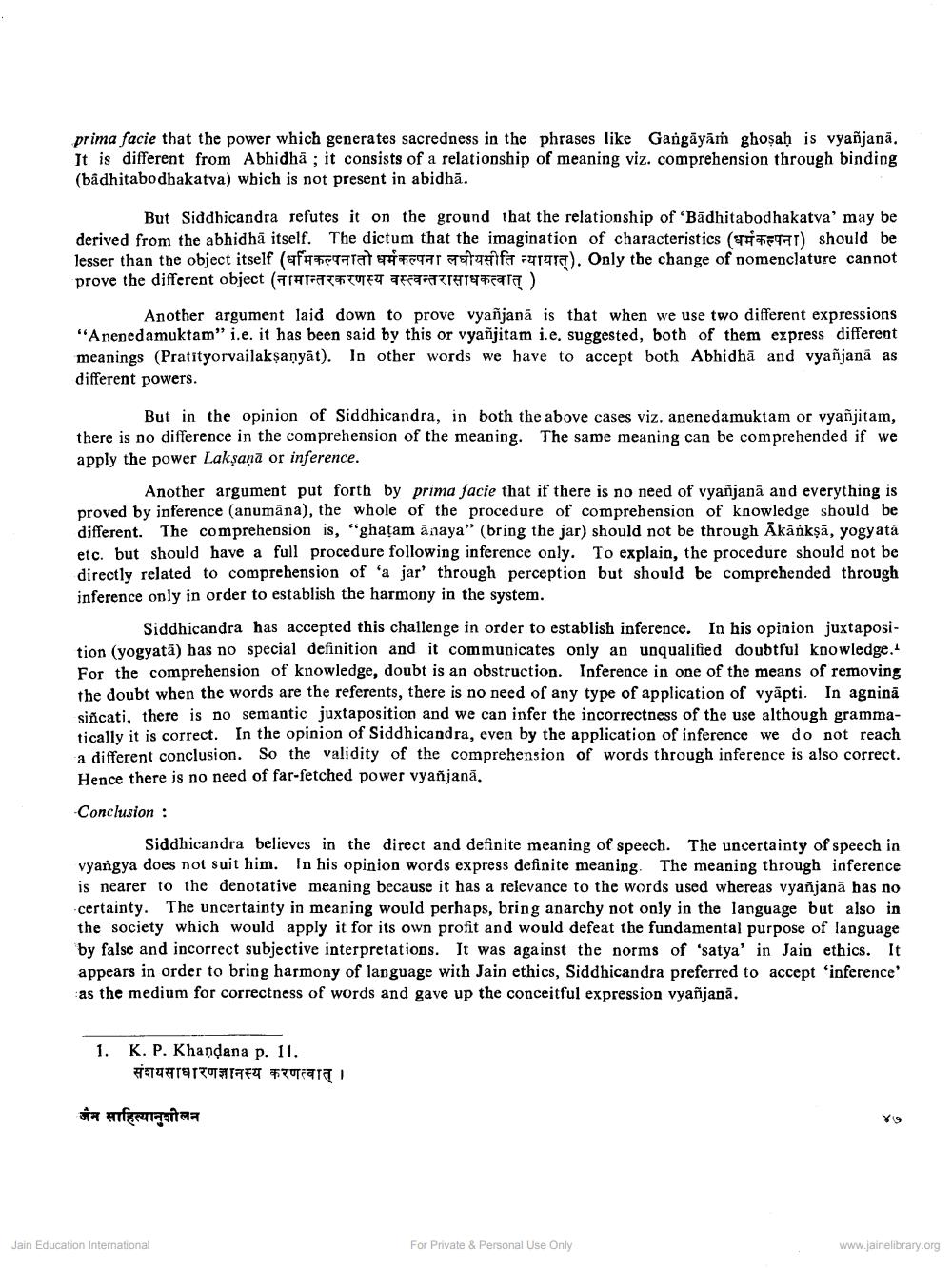________________
prima facie that the power which generates sacredness in the phrases like Gangāyāṁ ghoṣaḥ is vyañjanā, It is different from Abhidhā ; it consists of a relationship of meaning viz. comprehension through binding (bådhitabodbakatva) wbich is not present in abidhā.
But Siddhicandra refutes it on the ground that the relationship of 'Bādhitabodhakatva' may be derived from the abhidhā itself. The dictum that the imagination of characteristics (#FIETAT) should be lesser than the object itself (factata tar a fa FCTTTT). Only the change of nomenclature cannot prove the different object (AFTETTU ETT HTTPrata)
Another argument laid down to prove vyañjana is that when we use two different expressions "Anenedamuktam" i.e. it has been said by this or vyañjitam i.e. suggested, both of them express different meanings (Pratityorvailakṣaṇyāt). In other words we have to accept both Abhidhā and vyañjanā as different powers.
But in the opinion of Siddhicandra, in both the above cases viz. anenedamuktam or vyañjitam, there is no difference in the comprehension of the meaning. The same meaning can be comprehended if we apply the power Lakşana or inference.
Another argument put forth by prima facie that if there is no need of vyañjanā and everything is proved by inference (anumāna), the whole of the procedure of comprehension of knowledge should be different. The comprehension is, "ghatam ānaya" (bring the jar) should not be through Akankṣā, yogyatá etc. but should have a full procedure following inference only. To explain, the procedure should not be directly related to comprehension of 'a jar' through perception but should be comprehended through inference only in order to establish the harmony in the system.
Siddhicandra has accepted this challenge in order to establish inference. In his opinion juxtaposition (yogyatā) has no special definition and it communicates only an unqualified doubtful knowledge.1 For the comprehension of knowledge, doubt is an obstruction. Inference in one of the means of removing the doubt when the words are the referents, there is no need of any type of application of vyāpti. In agninā sincati. there is no semantic juxtaposition and we can infer the incorrectness of the use although grammatically it is correct. In the opinion of Siddhicandra, even by the application of inference we do not reach a different conclusion. So the validity of the comprehension of words through inference is also correct. Hence there is no need of far-fetched power vyanjanā.
Conclusion :
Siddhicandra believes in the direct and definite meaning of speech. The uncertainty of speech in vyangya does not suit him. In his opinion words express definite meaning. The meaning through inference is nearer to the denotative meaning because it has a relevance to the words used whereas vyanjanā has no certainty. The uncertainty in meaning would perhaps, bring anarchy not only in the language but also in the society which would apply it for its own profit and would defeat the fundamental purpose of language by false and incorrect subjective interpretations. It was against the norms of 'satya' in Jain ethics. It appears in order to bring harmony of language with Jain ethics, Siddhicandra preferred to accept 'inference as the medium for correctness of words and gave up the conceitful expression vyañjanā.
1.
K. P. Khandana p. 11. संशयसाधारणज्ञानस्य करणत्वात् ।
जैन साहित्यानुशीलन
Jain Education International
For Private & Personal Use Only
www.jainelibrary.org




